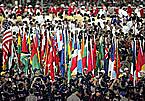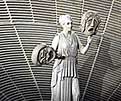By Daniel Patrick Welch
The author tells of his infatuation with the Olympic Games from early childhood--a spell unfortunately broken by ruminating on current events, U.S. policy, and the mind-numbing chatter of American talking head celebrity commentators.

I have a confession to make. Ever since I was a kid I have always loved the Olympics. I was in love with them ever since I was old enough to cry when they were over. Four years seemed like an eternity to me then, and the pomp-encrusted folding of the flag and the extinguishing of the torch left a lump in my throat. My early memories have fused with my vicarious Olympic experiences; so much so, in fact, that in researching this article I found several surprises. My wife (who is younger than I, and not of an American TV upbringing) asked if I remembered Tommie Smith and John Carlos giving the Black Power Salute at the 1968 Mexico games. “I was only four!” I laughed. But later, I found out that another very vivid memory was indeed from those same Games, and not 1972 as I had thought: My brothers and I spent long summer days trying to master the Fosbury Flop on a makeshift high jump apparatus in our backyard.
I’m not sure why I was so obsessed...My mother bears some of the blame and credit, packing up the whole crew and trekking to Montreal to spend the two Olympic weeks camped in a tent outside the city. Every day we would trek from our campground into the city to trade pins, hang out in endless lines, and occasionally score a few scalped tickets to whatever event we could.
I continued my obsession, writing every elective report I remember, from 6th grade through high school, on one Olympic theme or another. To my enduring shame, I wrote a junior year cliché exercise comparing the 1936 Berlin games to the 1980 games in Moscow; I got an A from a history teacher who allotted less than two minutes of discussion to all of Marx’s theories because, well, the bell rang.
My earlier memories were decidedly apolitical—Dick Fosbury over John Carlos; Mark Spitz over the tragedy of the 1972 Munich hostage debacle. By the time the Los Angeles games rolled around, my early memories were thankfully being supplanted by a new dose of adult reality. I distinctly remember feeling queasy, the hair on the back of my neck standing up at the guttural roar of the crowd screaming U..S..A….U…S.. A as our underchallenged athletes crushed all their non-communist foes. In one of life’s little ironies, as I sit writing this very paragraph, I hear announcers blabbing about the “depth and ability” of the USA men’s gymnastic team unrivalled since 1984—when the powerhouse teams of the USSR and Eastern Europe were boycotting in retaliation for the US’ 1980 boycott. I wished I had that paper to write over again. Peter Ueberroth became the darling of the Games, and of neocons and neolibs everywhere, by selling, as I recall, everything but the kitchen sink with the Olympic logo on it—and that omission wasnly because Moen and Price Pfister weren’t so much in the game then.

My favorite as a kid was the Parade of Nations. I know it’s a bit silly and pompous, but I loved seeing the flags and the costumes from all over the world. As I grew, my analysis grew less naïve as I watched the growing corporatization of the games, the frantic bidding over TV rights, the cynical jockeying for hosting privileges, and the hype the media now wrings from every available visual image, not to mention the relentless hopemongers of the advertising industry. This year we almost tuned out before the Parade of Nations, so turned off by the mindless blather of Katie Couric and Bob Saccomano (yeah…whatever). My obsession won out, and we managed to sit through it. However, I am disappointed and more than a little bitter to report that the spell—as irrational and deep-set as it was—may at last have been broken.
The winner of the TV tussle, invariably, is one American network or another, insuring that a billion people worldwide will be subject to the particularly narrow and idiotic musings of Katie and Sideshow Bob. Sports commentary is an idiom particularly susceptible to the uniquely American corruption of avoiding silence at any cost—especially, it seems, when the speaker has nothing of any import to say. Seizing the American spirit, we half-joked about making a drinking game out of it: something like taking a shot each time we heard the hapless couple at a loss for words when a new set of funny looking brown people wandered in, always reduced to commenting on their “colorful costumes.”
Julia and I checked the calendar to make sure that this was, indeed the year 2004. Are Katie and What-About-Bob unaware of the history of the phrase Colorful Native Garb? It would be fitting. Or have we inherited every racist behavioral tick of the erstwhile British Empire in addition to its former colonies, and the quaint belief that we can regularly invade them to “bring democracy.”
In 2004, more than a century after Gunga Din, the whole world is still hostage to this Anglocentric commentary. The empire dissolves, slavery is over, gays can get married, and then, Bob’s-your-uncle, the Colorful Garb is back. This incarnation is savvier, though—Bob knew to mention Greeks’ displeasure with “American foreign policy past and present,” without ever mentioning the ongoing slaughter in Iraq.
Crowd reaction was sifted and interpreted by the two cosmopolitan commentators, saving those watching the trouble of thinking for themselves. Viewers were treated to proxy tour of Americans’ world vision, appropriately abbreviated and simplified (of course) to suit the U.S. palate. When Arabs appeared, the conversation mysteriously drifted back to security; new adventures in U.S. imperialism were given special attention. An Afghan team appeared (featuring actual women for the first time!). Never mind the U.S. target range of a country they left behind, or that their two week respite from hell was facilitated by the U.S. military; likewise with the Iraqi delegation.
Qatar was famous for, among nothing else in particular, serving as “headquarters for the U.S. Operation Iraqi Freedom.” Well, Gosh! I think I preferred the colorful native garb. Taiwan, Korea, American Samoa and others were accompanied by long-winded explanations of their geopolitical status and the origins of their Olympic team. Palestine, whose two athletes received arguably the greatest roar of the Parade, met with an awkward pause from the uncharacteristically muted hosts.

The sad part is that the Parade of Shame will go almost unnoticed inside the U.S. The overwhelmingly ego-(amerigo?)centric perspective reflects a universal national ignorance of the rest of the world. Neither talking head will lose their jobs over their asinine jokes—they will instead be heralded as perfect representations of American “worldliness.” The smooth, saccharine patter that ignores the political reality in which these games are taking place knows no party, and has no cogent opposition within our borders. As Americans, we are too stupid, too force-fed, too lazy to look around and see that Burdick and Lederer’s Ugly American is a worse caricature than ever.
These Olympics, for me, abound with reminders that Americans remain dangerously ignorant about the rest of the world. A canary in a coal mine doesn’t sing any sweet songs to wake people up; it just up and dies.






Comments